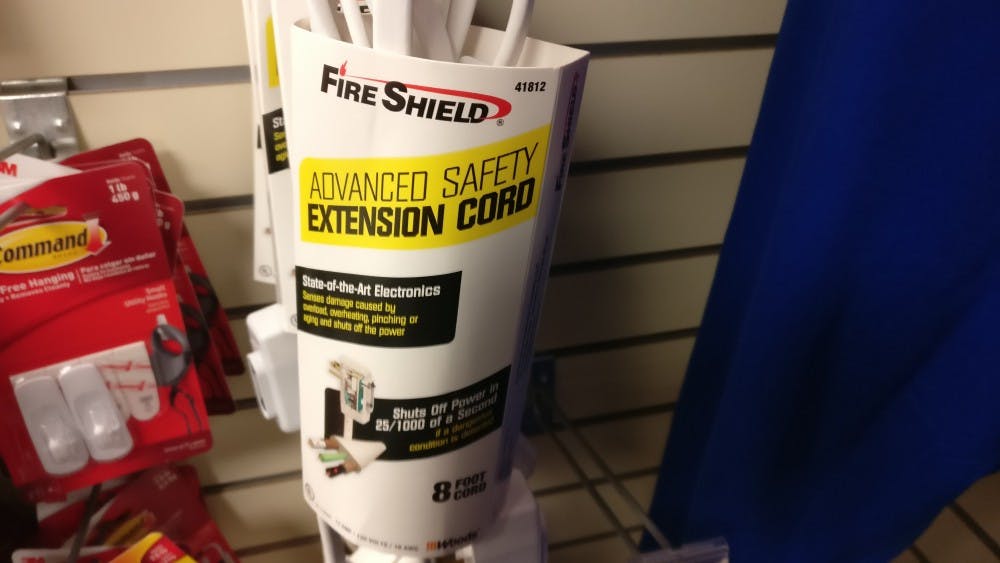The University of Richmond’s housing fire safety policy was revised in January 2018 to no longer require Fire Shield-brand power strips thus relaxing requirements to permit a wider non-Fire Shield range of options.
UR fire safety specialist Mike Bowles said the review of the Fire Shield requirement had been prompted by a Collegian story published last year. He added that no other portion of the housing policy had been changed.
The new policy reads: “Power strips or surge protector outlet strips must be listed by Underwriters Laboratory (UL) or another nationally recognized testing laboratory. The power strip or surge protector must have an integral circuit breaker or be fused. The cord must be a minimum of 14-gauge or heavier (12-gauge,10-gauge, etc.) and have a grounded plug. Each power strip or surge protector outlet strip must be plugged directly into a wall outlet and they cannot be plugged into one another. All electrical cords must be protected from damage. Avoid placing cords across the middle of floors, hallways, doorways, etc., or underneath area rugs, storage or clothing.”
Bowles explained that at higher gauge ratings (16-gauge, 20-gauge, etc.), the cord was thinner, had less insulation and was more likely to get pinched and have its internal wiring damaged.
“We opted to go ahead and go with the heavier cord to allow us still that cord protection,” Bowles said. “Maybe not the safest, but still, a compromise.”
The policy change does not extend to extension cords, however.
“Extension cords, multi-plug or cube adapters, plug-in air fresheners with an outlet(s), or any other outlet or receptacle not hardwired into the building or provided as part of an approved power strip or surge protector is unauthorized,” the policy reads.
The review of the Fire Shield requirement was conducted last year and involved Michael Miller, director of environmental health and safety, and Chief of Police David McCoy, among others, Bowles said.
The review involved checking what other universities’ policies were and asking the company that currently owns the rights to Fire Shield whether any other university still ordered the products, Bowles said. He found that no other university ordered or required Fire Shield anymore.
“When I got that information, I was like, ‘Maybe it’s time,’” Bowles said.
Patrick Benner, director of residence life and undergraduate student housing, said Bowles had come to him with the decision and had asked him what the impact of implementing the change would be. Benner is responsible for enforcing UR’s housing fire safety policy and updating relevant housing websites.
He told Bowles that the change would need to happen before winter break inspections, Benner said.
Enjoy what you're reading?
Signup for our newsletter
“I said, ‘If we’re going to do it, you have to do it cleanly, and there has to be a break,'" Benner said. "We can’t go into the next inspections not knowing what the policy is. It can’t be in limbo, because I wouldn’t want to find somebody responsible for it and the next week say it’s no longer a policy.’”
Inspectors of residence spaces for this past winter break were told not to count possession of non-Fire Shield products as violations.
Valerie Szalanczy, sophomore, said she viewed the change as positive and burden-relieving for students but that she wondered what implications it would have on inspection times.
“The only consequence I see of this that can be maybe negative is the fact that those checks may take a bit longer,” Szalanczy said. “Because they’re not looking just for a name. They’re looking for certain qualities that fulfill that framework in the policy.”
Bowles said the change would give students more flexibility in being able to choose cheaper options.
Elizabeth St. John, interim UR bookstore manager, said the bookstore still had more than 200 Fire Shield power strips and more than 100 extension cords in its inventory.
“I think we might continue to keep a small inventory of them,” St. John said. “We’ve been in contact with the company to see if they would take back some of what we have since it’s no longer a requirement. We’ve not heard back from them, so right now, the plan is just to keep selling them until we sell down.”
The bookstore staff do not plan on getting more and may consider either stocking other options or lowering the price of remaining Fire Shield products, she said.
Bowles said there had been little discussion about the former disparity in power strip policies between UR’s academic and residential buildings. He cited the extant fire code and said the residential buildings were still where people were known to live long-term.
In terms of safety, Szalanczy said she trusted the policy change and the review that brought it about.
Similarly, Bowles said he believed that the change would ultimately be all right.
“The only thing that will ferret all this out is time,” Bowles said. “But no, I think as long as we can get people to purchase the 14-gauge and don’t do the normal things, put it under your rug, put it under your furniture, those types of things, it’ll be all right.”
Contact news writer Arrman Kyaw at arrman.kyaw@richmond.edu
Support independent student media
You can make a tax-deductible donation by clicking the button below, which takes you to our secure PayPal account. The page is set up to receive contributions in whatever amount you designate. We look forward to using the money we raise to further our mission of providing honest and accurate information to students, faculty, staff, alumni and others in the general public.
Donate Now



